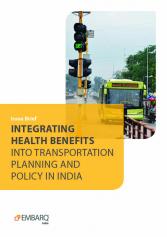
Anjali Mahendra, Veronica Conti, Madhav Pai & Lakshmi Rajagopalan
The publication aims at highlighting the strong connection between public health and transport planning, often unrecognized by either public health or transport practitioners in India. It is planned as an Issue Brief to ensure that transport is brought into the public health discourse and vice versa, and to make the case for conducting health impact assessments (HIA) for urban transport policies and investments prior to implementation. Particularly in developing countries like India, the health impacts from transport are significant, in the form of exposure to air pollutants, impacts on traffic safety and accidents, and the extent to which they encourage (or discourage) physical activity. These impacts can all be assessed through the HIA methodology demonstrated in the Issue Brief through the case study of the Indore Bus Rapid Transit (BRT) project, provided pre-project baseline health data is collected.
Through an in-depth literature review of the evidence regarding health impacts of transportation and methodologies to analyze them, a health impact assessment (HIA) methodology was developed for application in the urban Indian context. This methodology was then applied to the case of the Indore BRT project using original pre-project and post-project data. This kind of analysis has not been done before for a transport project in India and would provide important insights to both, public health and transport practitioners in India and other developing countries facing similar challenges with urban transport.
If you have any questions or comments, or would like to know more about the research, contact Anjali Mahendra at anjali.mahendra@wri.org
